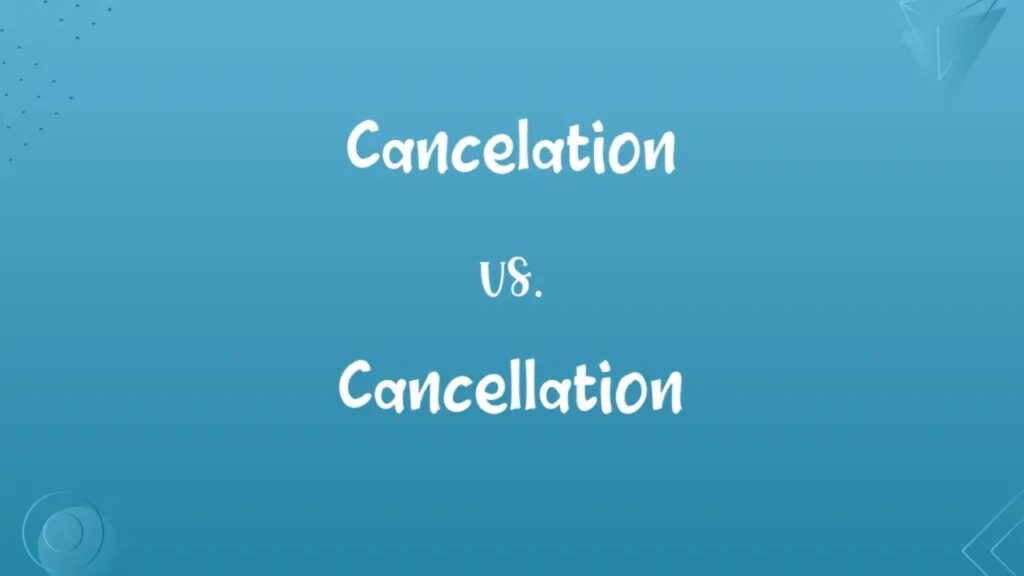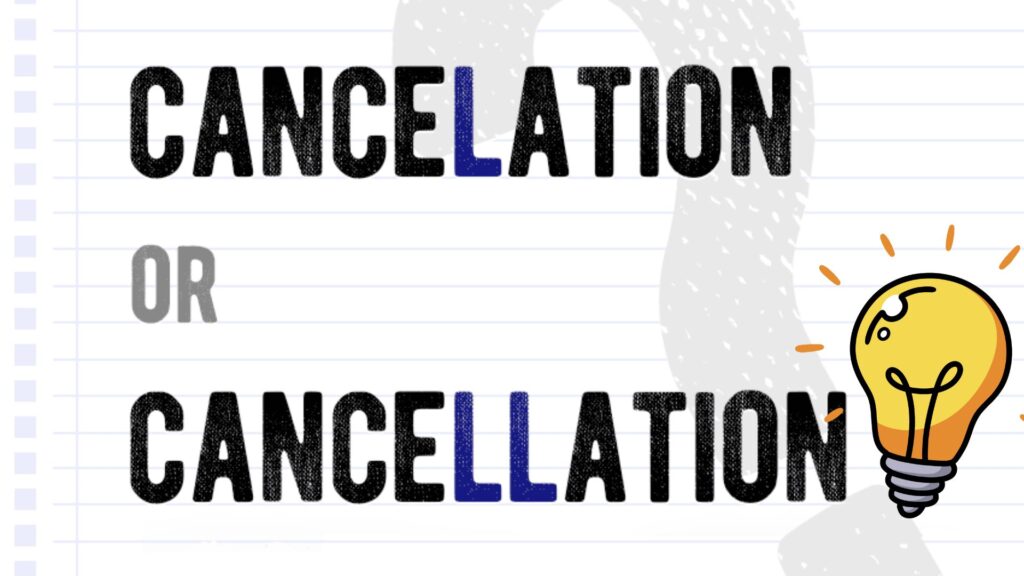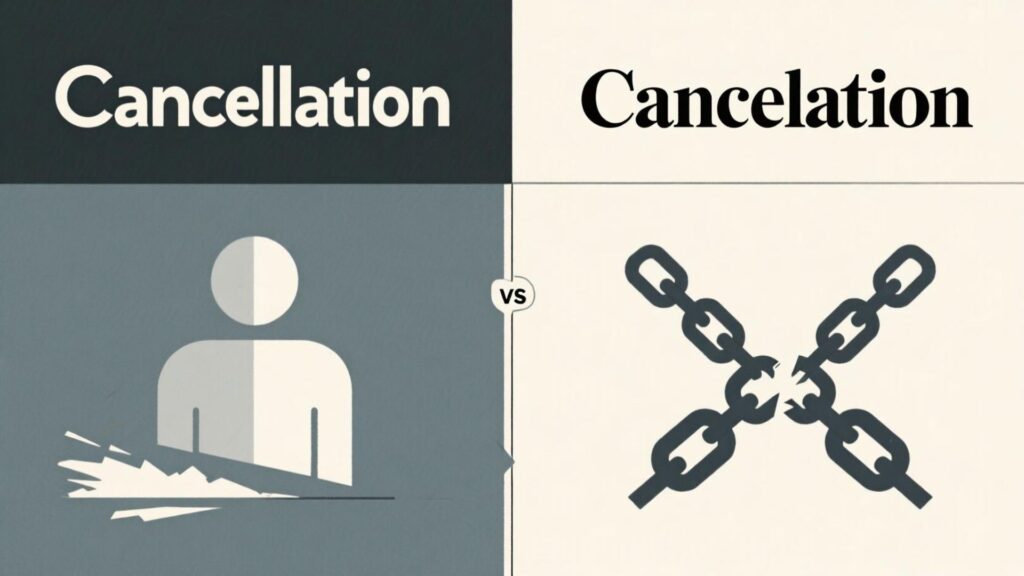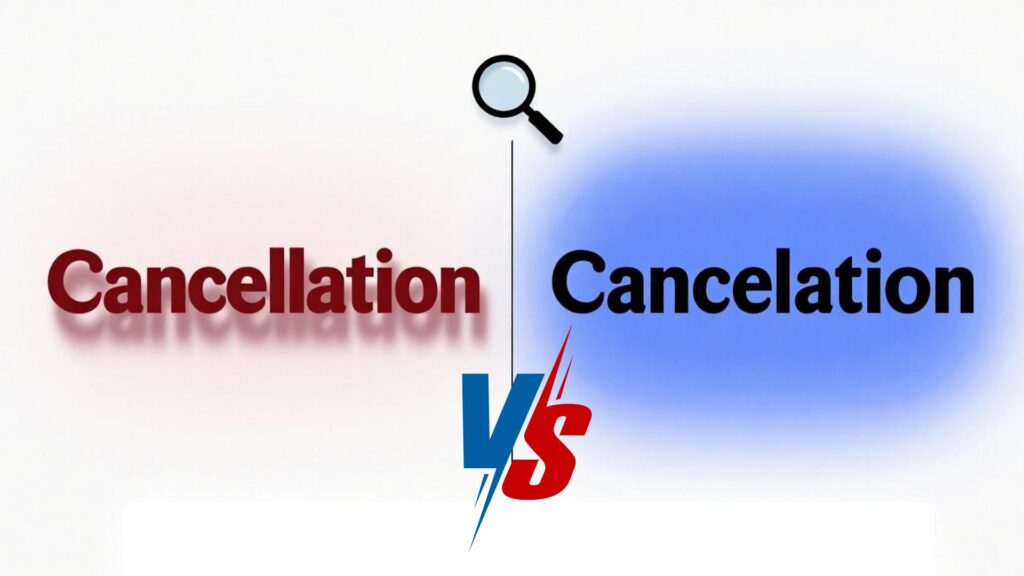English spelling loves to keep us on our toes. Just when you think you’ve nailed it, a little twist like “cancellation” vs “cancelation” pops up. Both words look correct, both sound the same but which one should you use? And does it really matter?
Spoiler alert: it matters more than you think, especially in formal writing, official documents, and business communication. Let’s break it down and finally put this spelling debate to rest.
Cancellation vs Cancelation: Intro Explanation

Both cancellation and cancelation refer to the act of calling something off a meeting, a subscription, a flight, or that yoga class you totally forgot about. So, meaning-wise, they’re twins. The real difference lies in spelling conventions.
Here’s the truth in one sentence:
“Cancellation” with two L’s is the standard spelling in both British and American English, while “cancelation” with one L is a rare American variant.
Simple Definition + Usage Overview
- Cancellation → Preferred worldwide, appears in British English and most American English contexts.
- Cancelation → Accepted in American English, but rarely used and looks odd to many readers.
So, if you want to sound polished and professional, cancellation should be your go-to.
Clear Rules & Patterns
To understand why these two spellings exist, let’s explore the rules:
- Rule 1: Doubling consonants before suffixes
In English, when you add “-ation” to a word that ends in a single consonant after a short vowel (like cancel), you usually double the consonant:
cancel → cancellation
travel → travelling (British) - Rule 2: American spelling simplifications
Thanks to Noah Webster’s spelling reform, American English often drops extra letters for simplicity. That’s why you see “canceled” (one L) in U.S. English and “cancelled” (two L’s) in British English. - Rule 3: Which stuck?
Despite Webster’s influence, cancellation with two L’s remained the dominant choice even in the U.S.
Why the Two Spellings Exist (A Quick History Lesson)

The word cancellation comes from the Latin “cancellare,” meaning “to cross out.” British English followed this origin and kept the double L when forming longer words. American English simplified some spellings, giving us “canceled” and occasionally “cancelation.” However, cancelation never gained widespread acceptance, even in the States.
Bulleted Rules with Do’s & Don’ts
Do:
✔ Use cancellation for formal writing, academic papers, and legal documents.
✔ Stay consistent pick one spelling and stick with it.
Don’t:
✘ Assume cancelation is British it’s not.
✘ Mix both spellings in the same document it looks unprofessional.
Examples of Cancellation in a Sentence
- “The airline announced the cancellation of all flights due to heavy storms.”
- “We received a notice about the cancellation of our subscription service.”
- “Her sudden cancellation of the meeting surprised the entire team.”
Examples of Cancelation in a Sentence
- “The unexpected cancelation of classes disrupted the academic calendar.”
- “He requested the cancelation of his hotel booking due to illness.”
Notice how the first set feels more familiar? That’s because cancellation dominates in real-world usage.
Scenario Examples (Emails & Policies)
Email Example Using “Cancellation”
Subject: Confirmation of Reservation Cancellation
Hi John,
This email confirms the cancellation of your dinner reservation for October 10 at 8:00 PM. If you’d like to reschedule, please contact us at least 24 hours in advance.
Thank you for choosing OceanView Restaurant.
Best regards,
Emma Williams
Customer Care Team
Email Example Using “Cancelation”
Subject: Notice of Service Cancelation
Dear Mr. Harris,
We’re writing to confirm the cancelation of your premium membership, effective immediately. If you wish to reactivate your account in the future, please log in and update your preferences.
Thank you for being a valued customer.
Sincerely,
Olivia Brown
Support Team
Before/After Examples in Everyday Context
Before: “Please confirm the cancelation of my contract.”
After: “Please confirm the cancellation of my contract.”
See the difference? The second feels standard, especially in business or legal writing.
Common Mistakes & Fixes
- Mistake 1: Using “cancelation” in British English documents.
✔ Fix: Always use cancellation in British English. - Mistake 2: Mixing spellings in one document.
✔ Fix: Pick one version (cancellation is safer) and stick with it. - Mistake 3: Thinking cancelation is a typo.
✔ Fix: It’s not wrong, just extremely rare.
Quick Reference Table
| Word | Preferred Spelling | Region |
|---|---|---|
| Cancellation | Yes | Worldwide |
| Cancelation | Rare | American English |
Linguistic Context: Related Forms

If this spelling war feels familiar, it’s because you’ve seen similar cases:
- canceled vs cancelled
- canceling vs cancelling
- canceler vs canceller
All follow the single vs double L rule, which depends on American vs British spelling conventions.
Semantic Nuance: Synonyms & Related Words
In case you’re hunting for alternatives, here are some synonyms:
- Revocation
- Annulment
- Termination
- Abolishment
Each fits slightly different contexts (e.g., legal contracts, event planning), but they all circle around calling something off.
Where You’ll See It Most: Common Phrases
- flight cancellation
- hotel reservation cancellation
- travel cancellation
- cancellation notice
- cancellation policy
- refund after cancellation
If you Google these, you’ll notice cancellation dominates almost every search result.
Which Should You Use?
Unless you have a strong reason (like matching an American style guide that allows cancelation), stick with cancellation. It’s safe, widely recognized, and avoids confusion in both formal and informal writing.
Final Takeaway
Language evolves, but clarity and professionalism never go out of style. So, when you’re drafting an email, writing an official document, or posting a company policy, remember:
“Cancellation” with two L’s is the spelling that wins worldwide.
Bugti is the founder of Quoethint.com, a hub for English language tips, writing advice, and grammar guidance. With years of experience in English studies and a passion for clear communication, Bugti created this platform to make grammar and writing easy to understand for everyone.
